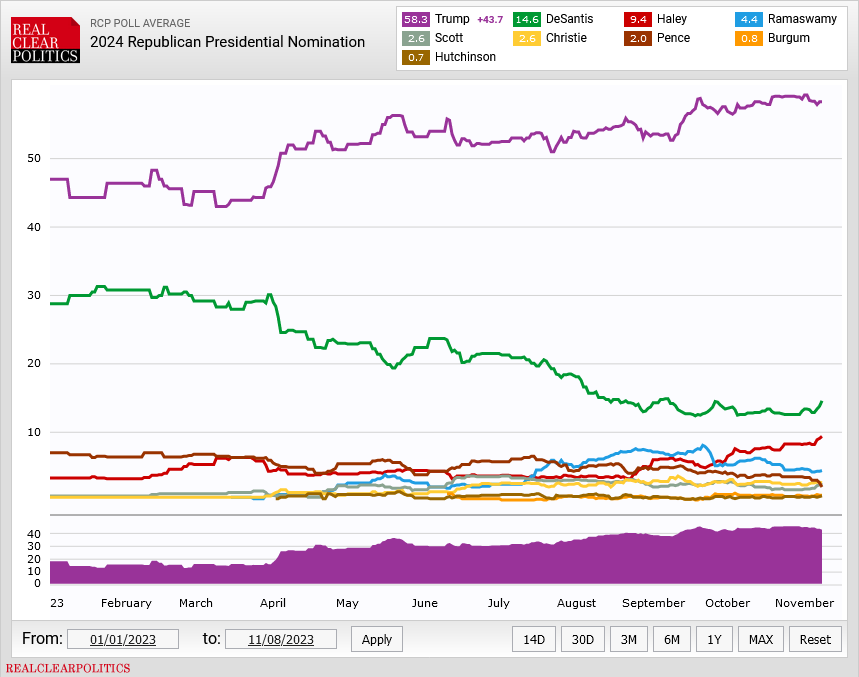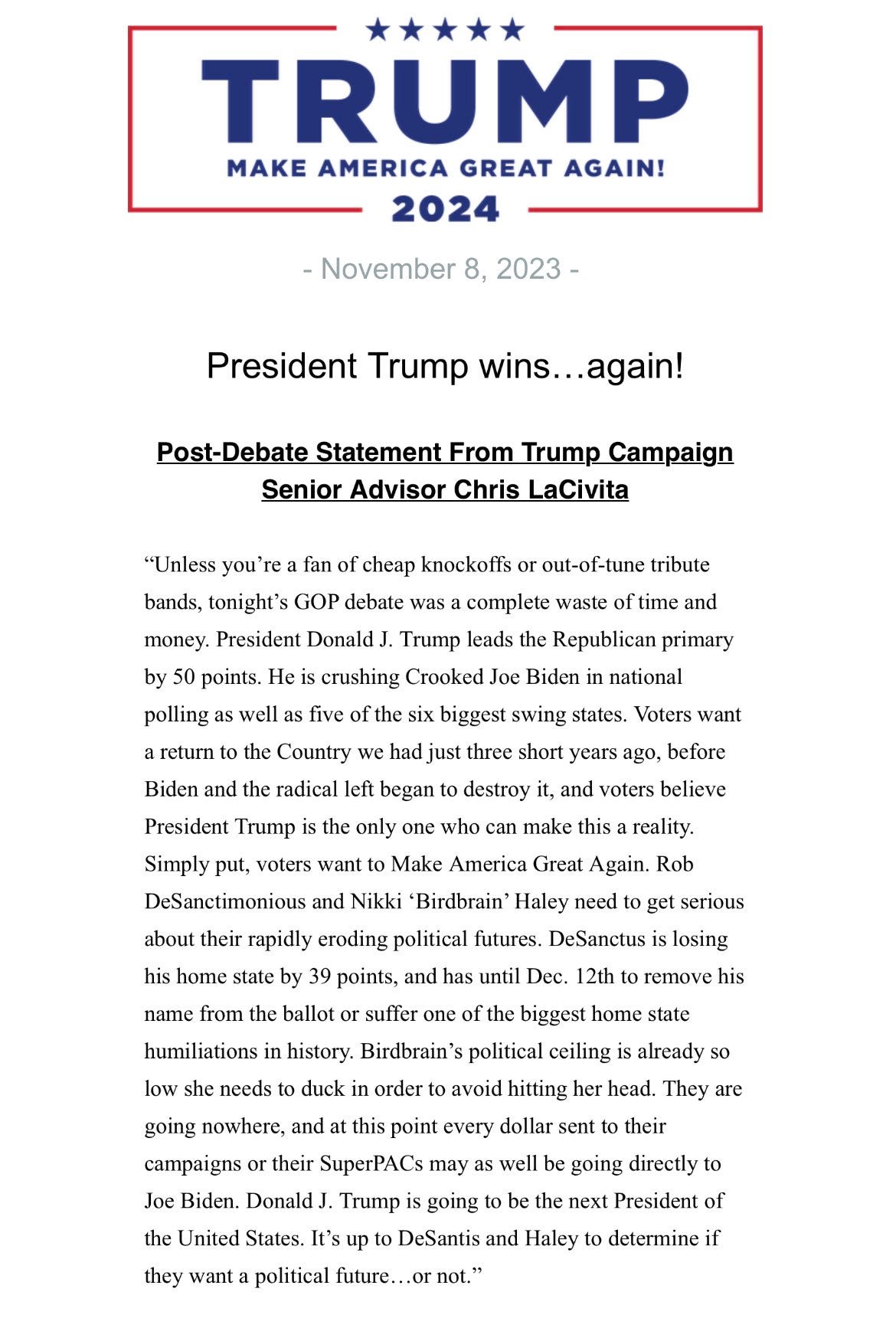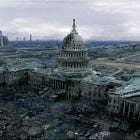Third time is supposed to be the charm, and that was more or less true last night with the third Republican Presidential Debate.
This debate, with a smaller roster of candidates—Mike Pence has dropped out and Doug Bergum did not qualify—was a more orderly affair. The audience even obeyed the ever-animatronic Lester Holt’s admonition not to applaud or show any enthusiasm.
However, the best that can be said of the debate is that it was orderly. The candidates themselves were predictable and even boring. None of them had any new talking points, and what they did have was formulaic.
Part of the reason Donald Trump has a Secretariat-like polling lead over the rest of the GOP field is because the rest of the GOP field is simply atrocious. That was made plain last night.
That lead is also the biggest problem the GOP has with these debates—they aren’t moving the political needle, and they certainly aren’t helping the party select an alternative to Donald Trump.
The Republicans finally had a Presidential debate that did not come across as a chaotic mess. They did not have a debate where anyone had anything to say.
To fully understand the futility that permeates the GOP debates, one has to not only realize that Donald Trump has had a commanding polling lead over the rest of the field from the get-go, but also that Trump’s lead has increased from the first debate to last night.
Not one candidate is gaining ground on Donald Trump. Not one candidate has successfully separated himself (or herself) from the rest of the pack.
Only Nikki Haley has had any sustained improvement from August until now.
Chris Christie has remained at about the same 2.5%-2.6% support in the polls, and every other candidate has lost ground. Even Ron DeSantis, who is still the “number two” candidate behind Donald Trump, is there not because he’s run a strong, smart, campaign, but because the other candidates have run weak, dumb, campaigns.
This is a field of candidates which has simply failed to capture any real enthusiasm among Republican voters. Donald Trump’s campaign summed up the situation fairly accurately with its statement about last night’s debate.
The debate was a waste of time and money. The candidates themselves are a waste of space.
Among the candidates, Ron DeSantis had consistently the best night. He did not make any serious flubs in his answers, and he did a good job of tying his answers back to his tenure as Florida’s governor. De Santis’ greatest strength as a candidate is that he has been a success as governor in a large and politically important state, and he played into that strength last night.
Unfortunately, De Santis also did not have any memorable moments. That was perhaps less obvious last night, because there were so few memorable moments even for the other candidates. Most of his responses to questions were formulaic and he did the usual annoying candidate tactic of using a question to talk about what he wanted to say before answering the question.
Even worse, De Santis made it clear he intends to be a wartime President.
He wants Israel to continue its war with Hamas in Gaza. Granted, it is a catchy soundbite to be telling Benjamin Netanyahu to “finish the job”, but it overlooks the wider reality of the Palestinian Arabs. De Santis had no view of the conflict between Hamas and Israel other than it being between Hamas and Israel—Hamas is a genocidal terrorist organization that must be eliminated, but they are not the whole of the Palestinian Arab people nor are they the whole of the opposition to the existence of Israel. “Finishing the job” means crafting a real and lasting peace, and simply eliminating Hamas will not do that.
Sadly, neither De Santis nor any of the other candidates even thought to mention the Abraham Accords1—the peace initiative begun under Donald Trump which Hamas arguably sought to derail with its October 7 attack. With oil prices and oil economies having an uneven 2023, the economic incentives for peace in the Middle East are high and rising. Even Iran, which is trying almost as hard as Washington DC to spread Israel’s war throughout the Middle East, may see its position in the Middle East upended by the economic and political rapprochement envisioned by the Abraham Accords.
He wants Ukraine to continue its war with Russia.
He wants to use the military against the Mexican drug cartels.
He wants to build enough ships in the US Navy to have war with China.
At a moment when many people are worried (rightly) about World War Three, does it really make sense for a political candidate to be doubling down on war?
Even more disturbingly, what kind of war will it be when the man most enthusiastic about war is also promising voters that US troops won’t be used to fight any wars? If there is to be war, soldiers have to go fight it; that is how wars work.
Vivek Ramaswamy was his usual shoot-from-the-lip high-energy self. In most respects, this has not served him well, but it did result in one of the few highlights of last night, when he fired a verbal broadside directly at Lester Holt and the corporate media.
It takes a certain chutzpah to stand in front of a debate moderator and tell him he is not the person who should be moderating the debate.
It was moments like this which persuaded many watching the debate to give Ramaswamy the “win” last night.
To his credit, Ramaswamy also was the candidate willing to talk about economic strategies for war, and the importance of securing US supply chains before entertaining the thought of war with China.
Unfortunately, on Israel, rather than talk about the economics of peace, Ramaswamy could only muster a facile and not original “smoke those terrorists” line. Rather than dwell on Israel and the Palestinian Arabs, Ramaswamy opted to pivot to the US southern border and the US need to secure that border.
The US does need to address its own borders, but until a solution is found that brings peace to both Israel and the Palestinian Arabs, the Middle East will remain geopolitically unstable. Ramaswamy ultimately ran from that issue.
However, we do have to give Ramaswamy kudos for his closing comments, where he called Dementia Joe a “puppet”.
Ramaswamy’s greatest weakness as a political candidate remains his lack of an edit filter. He is clearly attempting to emulate Donald Trump’s take-no-prisoners brashness from 2016, but hasn’t mastered the art of that much bravado. Pointing out that Nikki Haley’s daughter is on TikTok was simply unnecessary, and the audience was none too thrilled about it. Calling Haley “Dick Cheney in 3-inch Heels” is a catchy phrase, but all he could offer as an alternative was that he would be less corrupt.
His argument that the US can grow its economy and that would “fix” Social Security certainly sounds good, but it is predicated upon the US achieving levels of economic expansion greatly at odds with historical norms. “Zero Based Budgeting”2 is a useful budgeting approach in business, and there is a good argument to be made for its use in government, but it is still a leap of faith that Ramaswamy’s economic plans will achieve the growth he needs. He did not offer up enough details to make the case that his economic policies will be beneficial to the United States.
Nikki Haley is still the anti-China candidate. On every foreign policy question, she came down hard—at least rhetorically—against China.
In discussing Israel, she drew a connecting line between Hamas, Iran, China, and Russia, calling the three nations an “unholy alliance”.
Of the candidates, Haley was probably the strongest in calling for economic decoupling from China. None of them used “decoupling” specifically, but a great deal of energy was expended on the merits of Chinese entities purchasing land in the United States. Haley was emphatic on these points, which prompted the inevitable counter-punch by Ramaswamy about Haley referring to China as a “dear friend” while serving in Donald Trump’s candidate.
Haley’s forceful anti-China rhetoric, which has been a consistent trademark of hers throughout all three debates, won her some fans in the audience. An Iowa focus group gave Nikki Haley the debate win, and her foreign policy experience and credibility were major reasons for that.
Haley did have one major stumble, however: she let Ramaswamy get under her skin. After calling for a total ban on the Chinese social media app TikTok, she was caught flatfooted when Ramaswamy pointed out that Nikki Haley’s own daughter is active on TikTok.
While Ramaswamy’s dig at Nikki Haley’s daughter was a cheap shot and not at all necessary, she let the remark get to her, and her mama-bear response to Ramaswamy showed that she can be rattled—not a good look for a would-be President.
Like all the candidates, Haley was very forceful about her chosen anointed positions. However, when, Ramaswamy callled her out for her presumed “hypocrisy” on TikTok, she lost her cool and her composure. There was still bad blood between her and Ramaswamy at the end of the debate which was apparent even watching the debate online.
Like all the candidates, Haley never could get past the talking point stage of a debate question. When contenders for the Oval Office talk casually about conducting special forces raids into northern Mexico to attack the Mexican drug cartels, it would be a good idea to explain how such a tactic would not only be successful against the cartels, but also not offend Mexico or perhaps turn into a shooting war.
She was also a disappointment on abortion. While staking a pro-life position for herself, she offered up paeans about trusting states and voters to set their own abortion policies. It would be nice to have heard her—or any of the candidates—take the off-year elections Tuesday head on, and pledge to challenge the abortion measures recently enacted. It’s one thing to accept the will of the electorate, but it’s quite another to not even try to change the mind of the electorate. A pragmatic approach to abortion invariably means one chooses to be accepting of people ending the life of an innocent unborn child.
On some issues, people should swing for the cheap seats. Abortion is one of those issues.
Chris Christie had a better night than his previous debate performances, and it was because of one simple reason: he stopped his power whining about Donald Trump. Christie is far more credible and sounds far more like a potential President when he stops trying to be a political pit bull and starts focusing his rhetoric on policy.
He did make a good point on the question of fentanyl and how to address the ongoing crisis of opioid addiction in the US. While wanting to stop the flow of illicit drugs across the southern border, he also broadened his approach to talk about drug treatment and substance abuse rehabilitation. His most credible and authentic moments came when discussing the need for better responses to drug addiction in this country.
His other strong moment came when discussing how to go about a naval buildup to deter China. Of the candidates, he was the only one to stake a position on America’s submarine fleet and its deterrent potential against China. Any war with China will be primarily a naval war, and even if China chooses to invade Taiwan they still have to cross the Taiwan Strait to do so. The capacity of a submarine fleet to make amphibious operations extremely risky is a substantive point to make.
Unfortunately, Christie failed to address the time frame involved in building even one nuclear submarine. It is hardly effective strategy to deter China over the next year to focus on naval assets which take well over a year to construct.
All the candidates failed to pick up on China’s key strategic weakness—it has to import most of its oil. As I noted last fall, China has an ongoing vulnerability when it comes to energy.
When a country not only is not energy-independent but has no chance of becoming energy independent, facing the country down militarily is simply bad strategy. However the US opts to address the growing rivalry with China, China’s thirst for oil imports needs to be integral to the approach. None of the candidates thought to take this approach.
Tim Scott is still the most earnest candidate in the GOP field, and wants very much to be the most inspirational. He kept reaching for moments of soaring oratory last night, but kept running into the reality that he is not a soaring orator.
He also does not consider where his proposals lead.
On the question of the conflict between Israel and Hamas, and Iran’s likely involvement, his big idea for deterring a wider conflict was to strike targets inside Iran. This was his idea of projecting strength.
I recall back in 2020 how almost every media outlet as well as the Democrats were horrified when Donald Trump authorized the targeted killing of Iranian Quds Force commander Qassim Suleimani, Iran’s point man in dealing with its terror network of proxy fighters.
The major concern at the time was that Trump was building up to full-on war with Iran. As it turned out, Trump did not lead the US into war with Iran, and there was never any serious indication that Trump’s actions were likely to precipitate war with Iran.
Tim Scott is calling for full-on war with Iran. Attacking Iranian infrastructure, regardless of the strategic logic, is an act of war against Iran. Especially because of its terror network of proxy fighters, Iran has the capacity to wage war back in return. We should not forget that Iran is a primary sponsor not just of Hamas, but also of Hezbollah.
Tim Scott’s ideas for projecting strength would guarantee a wider war in the Middle East. Far from stymying Iran’s efforts to escalate and expand the conflict, Scott’s strategy would reward it. Iran’s efforts thus far in that regard have not borne fruit, and it surely is in both America’s and Israel’s best interests to keep it that way.
Tim Scott also came out as an unrealistic war-hawk by calling for a “three-continent strategy” for the US military. Presumably, he wants the US military to be capable of waging war on three continents simultaneously. That is a rather dramatic buildup of military capacity and begs the question of how Tim Scott as President would deploy that much capacity. Can such a military buildup lead to anything other than a continuation of the illegal “forever wars” that have bedeviled the United States since even before the Obama Administration, and are exhibit “A” against what I have termed our “post-Federal” corrupt government?
Tim Scott did have a good moment on the topic of inflation. He correctly assessed the role energy prices have played in overall consumer price inflation, and his assertion that “energy dominance”, where the US is a major exporter of oil and energy, would go a long way towards combating inflation is difficult to argue.
Scott also scored a nice hit on moderator Lester Holt. When Holt asked about what a President Scott would do right away to address energy prices and inflation, Holt tried for a “gotcha” moment by dismissing Scott’s proposals for more drilling and more pipelines as being too long term. Scott correctly shut Holt down on that, pointing out the role of expectations in price levels, and that a commitment to energy exploration, production, and distribution would produce an expectation of future energy abundance which would, in turn, produce a downward pressure on prices is exactly right.
While Ramaswamy was going for the most soundbites on inflation (and just about everything else), Scott probably gave the most economically sound responses of anyone on the stage.
Ironically, Tim Scott in these debates has made an excellent case for himself as a legislator. He is at his most comfortable discussing how to move policy through Congress and how to translate policy into legislation. These are estimable political skills, but they are not the estimable skills of a chief executive. Tim Scott has very likely put himself on track for a leadership position within the Senate, but that trajectory is one that moves him away from the Oval Office and not towards it.
As discussions of policy, last night’s debate was shallow and uneven. Very little depth was pursued on any topic, and in large measure that is the fault of the moderator, Lester Holt, who with each passing day looks and sounds more and more like the “Johnny Cab” robot from “Total Recall.”
His admonitions to the audience to refrain from raucous applause were condescending and paternalistic. His reluctance to give rebuttal opportunities and follow up questions prevented any issue from receiving any real depth of treatment—an ironic handling of the debate given the “importance” Holt attached to the questions when scolding the audience for being an audience. Nikki Haley quite rightly zinged him on the lack of rebuttal opportunities after being studiously ignored multiple times when seeking to rebut a criticism launched at her by either Ron DeSantis or Vivek Ramaswamy.
Lester Holt’s primary purpose last night was to work through a series of questions. You could almost see him ticking off each question. He was not moderating a debate—not even in the modern political sense where candidates answer questions—but conducting a simultaneous series of interviews. Any one of the subjects covered last night—Israel, immigration/border security, Ukraine, or inflation—is worthy of an entire debate all unto itself. Cramming several large and complex issues into a single debate ensures none of them receive the level of commentary and discussion they deserve.
Between Holt’s colorless moderation and allergy to candidate theatrics, as well as the candidates themselves and their inability to move beyond soundbites and talking points, the entire debate ultimately was a snoozer. I think I might have actually nodded off at one point, that is how dull it was!
Ultimately, it most likely is not possible for these debates to be anything but dull—because they ultimately cannot be relevant. Even with accounting for polling bias and sampling errors, Donald Trump is on course to win the GOP nomination by acclamation. He has already won the contest, even before the first primary ballot is cast.
Much of this is the failure of Ronna McDaniel and the GOP. With the exception of DeSantis and Ramaswamy, the GOP is pulling a page from the Democratic playbook and fielding the same tired names with the same tired talking points as before. These are all political insiders seeking to lead a country that is heartily sick of political insiders—even DeSantis is backed by his roster of corporate and big money sponsors. Ramaswamy is a genuine outsider, but unfortunately he’s also a genuine amateur at politics. His idea of speaking “hard truths” is to say bombastic and usually offensive things about somebody, while refusing accountability for his own sins. That level of hypocrisy is pretty blatant, and its a major reason Haley has taken over his slot in the poll rankings.
We should remember that the 2016 GOP field was also a crowded field, but it was filled not just with the likes of Donald Trump, but also Rand Paul, Ben Carson, and even Ted Cruz. The GOP has become by far the more diverse political party in the United States, and has had the deepest bench of political up-and-comers. For this slate of has-beens and naifs to be the best the GOP can do should be an embarrassment to the Republican National Committee and every elected official with an (R) after his or her name.
After last night’s debate, the best thing the GOP can do now is to dismiss all the other candidates, cancel all future debates, and go all-in on Donald Trump. No matter what happens with Trump and the array of legal issues being thrown at him, he is a stronger candidate, and a more popular candidate, than anyone else who threw their hat in the Republican ring.
With Donald Trump, the GOP has lots to say, and a man who wants very much to say it. Last night on the debate stage, no one had anything of note to say, and were not very good at saying even that.
The Abraham Accords - United States Department of State. 3 Oct. 2023, https://www.state.gov/the-abraham-accords/.
Kagan, J. “Zero-Based Budgeting: What It Is and How to Use It.” Investopedia, 2023, https://www.investopedia.com/terms/z/zbb.asp.












"the rest of the GOP field is simply atrocious" which is why I didn't watch it knowing that you would and deliver an excellent report on it. And yes, Tim Scott is essentially leading himself away from the position, but maybe not accidentally, maybe to get a cabinet level position in the next Trump administration.
Great summary!
Great summary. My take is that the establishment is planning on forcing Nikki Haley on us all. It just seems the party "leadership" does not understand, we are done with these same wretched people doing only things that enrich themselves and the donor class and neglecting the rest of the country. I just dont know if they will let Trump back in even with his poll numbers...interesting times we live in.